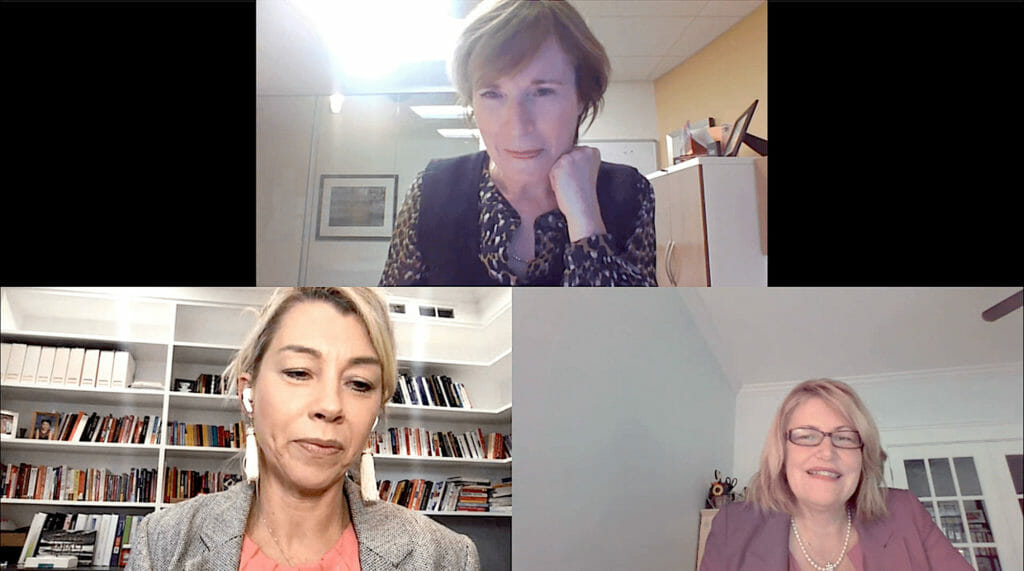
It’s a perennial challenge for business professionals: How to balance the demands of our personal and professional lives. But COVID has added a new twist.
“The current environment we’re operating in, with the COVID environment, is one that encompasses even more challenges with remote work and kids at home, and juggling school, and just all of the complexities that we face each day,” Capital Senior Living CEO, President and Director Kimberly Lody said last Thursday.
Lody was part of a panel of speakers discussing “Achieving Work-Life Integration” last week at the Argentum Senior Living Executive Conference. With her were Sunrise Senior Living Chief Clinical Officer Sue Coppola, Aegis Living Chief People Officer Sandra Preyale and moderator Nicole Moberg, chief operating officer for Thrive Senior Living. The session was part of Argentum’s Women in Leadership initiative, but as Lody noted, “It’s a very real challenge for nearly everyone these days, regardless of your gender, your career, your geography, your marital status — whatever defines you.”
If one thing Preyale said is true — that “bringing your whole self is really what allows you to be your best self” — then you’ll want to read some of their top strategies for integrating the personal and the professional.
Begin the week with a plan, incorporating the items on which you won’t compromise.
“If you think about your personal and professional goals, there should always be something that’s non-negotiable,” Moberg said.
Moberg shared the story of a conversation she had with her then-4-year-old daughter at a time when Moberg was traveling a lot for work. When Moberg asked her daughter what was important to her in their relationship, “dance parties” was the answer.
“So starting at 4 years old and to this day, if I’m home and not traveling on the road, before we go to bed, we do dance parties,” Moberg said, adding that the lesson can be applied to any relationship. “What intentional conversations can you have with people you love in helping to create that work-life integration?” she said.
Don’t be afraid to tell people at work about your non-negotiables, Moberg said.
She also shared a story about the time the CEO of her company texted her to see whether she could talk, but it was 7 a.m., a time she reserves every day to sit with her children as they eat breakfast. “I responded, ‘I can’t. This is that time I told you about,’ ” she said. “He said, ‘This is the best text I’ve ever received from you.’
“In that moment, I realized, it’s not just about your non-negotiables. It’s about truly owning your non-negotiables,” Moberg said. “Can things hijack that? Absolutely. But it’s up to you to take ownership of them.”
Lody said she has two non-negotiable items in her plans. One is “starting and finishing every day with family,” and the other is “getting outside.” She said she schedules those activities into every day “because it makes me feel better. It makes me feel that I accomplished not only a heavy day at work, but I also got that personal interaction into my life.”
It’s difficult to not compromise on a schedule once it’s made, Lody said, adding, however, “You have to keep those things sacred for your own integration and balance but also for those around you so that they know how important they are to you.”
Lody said she keeps to-do lists that she reviews and revises every day “so that I know exactly what’s ahead for me the next day and then in the days forward.”
She also stays connected, she said. “I try to do that kind of around the clock, honestly, so that I stay close to my team members and to projects on real time,” she said. “But I also set boundaries around that, so that while I may be around-the-clock and that may be a requirement of my position and what I may have going on in my life, what I don’t do is set that expectation for everybody else around me. We’re in a 24/7 business, so we really must always be available, but that doesn’t mean texting team members at 3 a.m. because you just thought of a great idea on a non-urgent item, because then people feel like they need to respond back to you, and it creates a counterculture of what you’re trying to achieve in the integration.”
Factor your loved ones into your weekly plan.
Coppola, a single mother of two children, said, “I found it really important on the planning side to not only plan for what I had going but for what they had going in their lives … so that they knew what they could expect from me and when I could be there for them, and I knew where they would be and what I needed to be doing that was important to their days as well.”
Have a backup plan.
Coppola also recommended having back-up plans “because of the unexpected, whether unexpected at work or unexpected at home. Really being able to have people you can rely on to help you out is really, really important to success, because no matter how much we plan, there’s always the unexpected.”
Listen to your inner self.
Preyale, also a single mother, advocated for: “knowing yourself. Being self-aware. Knowing what you need. Knowing when you need to stop. Knowing that you need time to yourself, and knowing that you can push yourself more, and listening to that. Just listening to your inner self and what you need.”
Recognize your team.
It’s also important to have a great team, Preyale said.
“I could not have the quality of life I’ve had through work-life integration if I didn’t have a great team,” she said. “And I’ve invested throughout my career in really having a great team and recognizing them, because I’m empowering them, because they’re the ones helping me.”
Involve your loved ones.
Involving those we love in what we do and why we love what we do also helps with work-life integration, Preyale said. “It helps us feel less guilty when we’re working a lot,” she said.
Get enough sleep.
Coppola said getting enough sleep is her No. 1 strategy for balancing her personal and professional life.
“When I start out with my plan for the day and the week, I really look to try to figure out that I can get my eight hours of sleep. If I can get that, I am in really good shape and I can cope and manage with anything,” she said.
Ensuring adequate sleep is not always as easy as it sounds, Coppola added. “It’s usually the first thing, as busy people, that you’re willing to give up on … and that can really impact your ability to see things clearly and really cope,” she added.
Lody also said that sleep is a top priority for her as well.
The panelists also discussed maintaining career momentum and avoiding burnout. Those who registered for the conference can watch the entire session on-demand.



